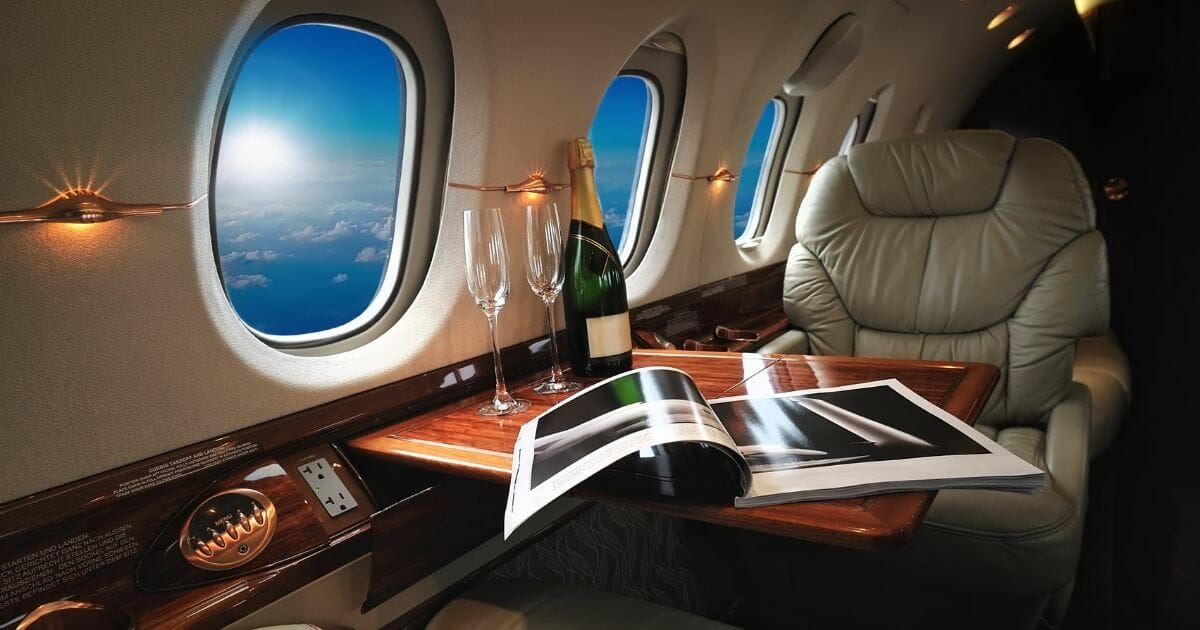
Flying Shouldn't Just Be a Privilege of the Ultra-Rich
In 2019, for the second year in a row, passenger travel on U.S. airlines and foreign airlines is up. This is a welcome change from the 2007 to 2010 recession period when every year fewer passengers flew.
As you might imagine, the recession was a double whammy — it had a deleterious effect on the bottom line of the airline industry and for consumers, it reinforced a negative impression of flying.
As losses mounted, the industry was forced to adopt tightening measures affecting space, amenities and routes. Consequently, passengers with their own tighter budgets were faced with new fees, higher costs and more crowded planes.
This led to a vicious cycle. As more airlines cut back, more Americans showed a reduced willingness to fly. The real cause of the trouble — the spike in oil prices and the poor economy that hit almost simultaneously — was overlooked.
As a consequence, business travelers and well-to-do tourists embarked on a new trend. They flocked to international luxury airlines with names like Emirates, Etihad and Qatar Airways — airlines that provided hedonistic levels of creature comforts for their passengers.
Qatar Airways offered an on-board cocktail lounge complete with a full bar and fresh fruit as well as high-tech infotainment systems.
Emirates Air provided the “Shower Spa” on their A380s that was a spacious bathroom complete with a private shower and a full-length mirror along with Bvlgari toiletries.
Etihad Air boasts of its first-class amenity bags. Men are presented a leather cuff-link box, while ladies get a Swarovski crystal-studded clutch.
Singapore Airlines stepped forward with its gourmand selection created by 8 professional chefs with menu items including duck foie gras, malossol caviar and stuffed lamb loin kebabs. And Air France rolled out the LA Premiere suite that included a 6.5-foot bed.
Except for Air France, each of the aforementioned airlines is state owned. And though Singapore Airways is state-owned it’s run as a “for-profit” airline that uses a successful strategy of both differentiation (innovation and service excellence) and cost leadership to maintain profitability. This approach is one of the reasons Singapore Airlines regularly wins the World’s Best Airline Award from Condé Nast Traveler while being among the industry’s most cost-effective operators.
Etihad, Qatar and Emirates, by contrast, could easily make sybaritic travel available to the well-heeled traveler for two reasons: One, many of these customers they catered to were not as sensitive to travel prices so higher ticket fees weren’t their primary consideration for air travel. Two and most importantly, these airlines are heavily subsidized by their national governments and don’t have a need to watch the bottom line.
These Gulf State carriers are able to poach the best customers while marginalizing their competition — market-based airlines that must sink or swim based on the market.
Profit-seeking airlines offer a mix of economy, premium economy, business and first-class flights on their planes. They make it possible for students, families on a budget as well as business and wealthy tourists to travel. It isn’t practical for the market-based airlines to cater solely to the wealthy. While first class international ticket prices carry a higher profit share, the airlines must also have economy class fliers to achieve profitability.
Qatar and Emirates offer flights for economy passengers, but the subsidies these airlines receive mean that they can offer flights and services without regard to profitability and in the process cater to their affluent passengers in ways that are a significant challenge for their competitors.
American carriers, as airlines for people of all incomes, have made it possible for all Americans – white collar and blue collar – to travel all over the globe.
As fuel prices have undergone wild gyrations, the Middle East nation-state carriers have lavishly catered to affluent flyers and in the process placed significant economic pressures on the privately run airlines, particularly those based in the U.S.
By 2015, the major carriers in the U.S. went to the Obama administration with evidence that Qatar Airways, Emirates and Etihad had received $50 billion in unfair subsidies from their governments. These complaints weren’t taken seriously, however, until the advent of the Trump administration.
Early last year Qatar and the U.S. reached an aviation agreement that Qatar Airways would submit financial audit records compliant with internationally recognized accounting standards. By 2020, Qatar Airways will publicly disclose significantly sized new transactions with other state-run enterprises such as fuel producers and Qatar agreed that it wouldn’t expand U.S. to EU flight operations.
A few months later a second agreement was reached with the UAE that required Dubai to change the way it finances and operates Emirates and Etihad Airways including a commitment to end government subsidies.
Just as the accolades for the new agreement were subsiding, Qatar announced it had taken a 49 percent stake in Italian carrier Meridiana Airlines which it rebranded Air Italy. Air Italy subsequently announced that it would begin transcontinental flights to the U.S.
Early last month, Secretary of State Mike Pompeo was questioned about Air Italy and its newly expanded U.S. operations. He indicated that the U.S. was examining this development very carefully.
While Qatar Airways agreed to limit flights between the U.S. and the EU, nothing in the agreement contemplated that Qatar might go out, acquire a carrier and make Europe-U.S. flights part of its regular operations.
Since Air Italy as a carrier isn’t bound specifically by the most recent Qatari agreement, this “Italian airline” with subsidies from Qatar could replicate the luxury model of the Gulf carriers. Alternatively, it could simply adopt a predatory pricing strategy that dramatically captures existing EU to U.S. market share. The latter is the approach presently being undertaken, but if left unchallenged it remains to be seen which model will be adopted.
Either approach is in conflict with the intentions of the most recent Open Skies Agreement. To be clear: Air Italy should agree to be bound by the Qatari airline agreement.
Especially as U.S. airlines are just again experiencing profitability, now isn’t the time to allow the international market to head back to the anti-competitive subsidy policies of yesterday. Flying shouldn’t just be a privilege of the ultra-rich.
Horace Cooper is a legal commentator and is a senior fellow with the National Center for Public Policy Research.
The views expressed in this opinion article are those of their author and are not necessarily either shared or endorsed by the owners of this website. If you are interested in contributing an Op-Ed to The Western Journal, you can learn about our submission guidelines and process here.
Truth and Accuracy
We are committed to truth and accuracy in all of our journalism. Read our editorial standards.
Advertise with The Western Journal and reach millions of highly engaged readers, while supporting our work. Advertise Today.











